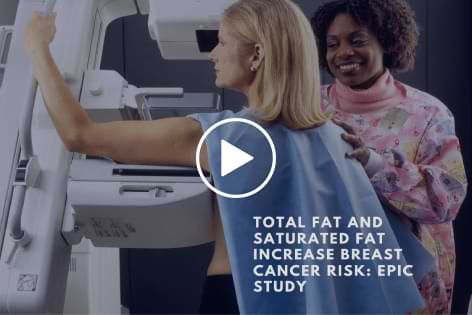
LMU 07 - Impact of Dietary Fat Intake on Breast Cancer Risk: Insights from the EPIC Study
Source: Journal of the National Cancer Institute, April, 2014. Vol. 106, No.5
Lifestyle Medicine Update (April 22, 2016)
Introduction:
Welcome to Lifestyle Medicine Update, where we discuss the latest research on various health topics. In this edition, we delve into a study published in the Journal of the National Cancer Institute in April 2014, shedding light on the relationship between dietary fat intake and breast cancer risk. The study in question is part of the European Prospective Investigation into Cancer and Nutrition (EPIC), one of the most significant human cancer studies ever conducted. Let’s explore the findings and their implications for breast cancer prevention.
The EPIC Study: An Overview
The EPIC study has been ambitious, tracking 337,327 women across ten European countries for over 11.5 years. This extensive research aimed to identify potential links between diet, nutrition, and cancer, focusing on breast cancer. The study analyzed data from 10,062 breast cancer patients, making it a substantial and reliable source of information.
The Role of Dietary Fat
Researchers have long been interested in the role of dietary fat in breast cancer development. This study specifically examined the impact of total and saturated fat intake on breast cancer risk. The results highlighted a concerning connection between high-fat diets and increased breast cancer risk, particularly for women who consumed significant amounts of saturated fat.
Key Findings: Fat Intake and Breast Cancer Risk
The EPIC study revealed that women with the highest consumption of total fat and saturated fat had up to a 50% increased risk of breast cancer compared to those with the lowest intake of these fats. This finding suggests that dietary habits significantly affect breast cancer development.
Subclasses of Breast Cancer and Dietary Fat
Breast cancer is not a singular disease but comprises different subclasses based on receptor status. These include estrogen receptor-positive (ER+), estrogen receptor-negative (ER-), progesterone receptor-positive (PR+), progesterone receptor-negative (PR-), and Her-2 positive (Her-2+) or Her-2 negative (Her-2-).
The EPIC study provided insights into the association between dietary fat intake and specific subclasses of breast cancer. A high-fat diet, incredibly saturated fat, increases the risk of estrogen receptor-positive and progesterone receptor-positive breast cancer. Furthermore, saturated fat was mainly linked to aggressive Her-2-positive breast cancer development. Researchers theorized that saturated fat may contribute to over-expression of the Her-2 receptor, thereby increasing the risk of this form of breast cancer.
Genetics and Dietary Fat: Unraveling the Connection
Genetic inheritance only accounts for a small percentage (10-20%) of breast cancer cases. Therefore, the EPIC study’s findings on the substantial impact of dietary fat intake on breast cancer risk are essential. The results suggest that adopting healthier dietary habits may help reduce the risk of breast cancer, providing an actionable approach to prevention.
Recommendations for Breast Cancer Prevention
As a proactive measure to prevent breast cancer, it is crucial to encourage women to modify their diets and reduce their total fat and saturated fat intake. Foods typically high in unhealthy fats include beef, pork, high-fat dairy products, deep-fried foods, creamy salad dressings, breaded meats, and high-fat pastries. By replacing these items with healthier alternatives, individuals can reduce their risk of not only breast cancer but also heart disease and other cancers, as indicated by the EPIC and other research studies.
Conclusion
The EPIC study has offered valuable insights into the relationship between dietary fat intake and breast cancer risk. By identifying a 50% increased risk of breast cancer associated with high total fat and saturated fat consumption, the study emphasizes the importance of adopting healthier eating habits to mitigate this risk. By reducing the intake of saturated fats and choosing a balanced and nutritious diet, women can take proactive steps toward protecting their breast health.
We hope you will share this critical information with the women in your life. The EPIC study’s research reference is provided below for those interested in delving further into the topic.
Reference:
S. Sieri, P. Chiodini, C. Agnoli, V. Pala, F. Berrino, A. Trichopoulou, V. Benetou, E. Vasilopoulou, M.-J. Sanchez, M.-D. Chirlaque, P. Amiano, J. R. Quiros, E. Ardanaz, G. Buckland, G. Masala, S. Panico, S. Grioni, C. Sacerdote, R. Tumino, M.-C. Boutron-Ruault, F. Clavel-Chapelon, G. Fagherazzi, P. H. M. Peeters, C. H. van Gils, H. B. Bueno-de-Mesquita, H. J. van Kranen, T. J. Key, R. C. Travis, K. T. Khaw, N. J. Wareham, R. Kaaks, A. Lukanova, H. Boeing, M. Schutze, E. Sonestedt, E. Wirfalt, M. Sund, A. Andersson, V. Chajes, S. Rinaldi, I. Romieu, E. Weiderpass, G. Skeie, E. Dagrun, A. Tjonneland, J. Halkjaer, K. Overvard, M. A. Merritt, D. Cox, E. Riboli, V. Krogh. Dietary Fat Intake and Development of Specific Breast Cancer Subtypes. JNCI Journal of the National Cancer Institute, 2014. Vol 106, issue 5.
http://jnci.oxfordjournals.org/content/106/5/dju068

Dr. James Meschino
ABOUT THE AUTHOR
Dr. James Meschino, DC, MS, ROHP, is an educator, author, and researcher having lectured to thousands of healthcare professionals across North America. He holds a Master’s Degree in Science with specialties in human nutrition and biology and is recognized as an expert in the field of nutrition, anti-aging, fitness, and wellness as well as the author of numerous books.


